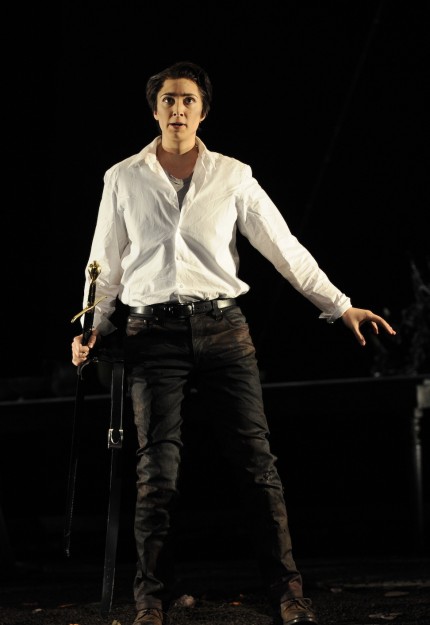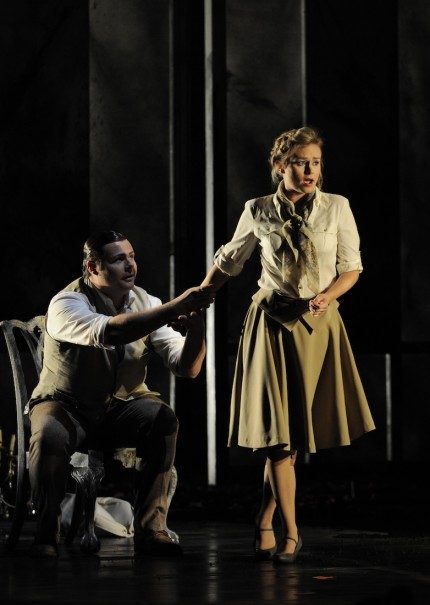COT wraps Medea cycle with a supremely stylish and well sung “Teseo”

When last we left Medea, she had murdered her children and burned Corinth to the ground. What can a sorceress do for an encore?
We found out Saturday night at the Harris Theater with the opening of Chicago Opera Theater’s production of Handel’s Teseo. This third and final installment of the company’s three-year Medea trilogy, follows Charpentier’s Médée last year and Cavalli’s Giasone (Jason) in 2010. And with the most consistent cast and a supremely stylish staging, Teseo was far and away the most successful of the company’s Medea series.
Teseo is an early Handel work, following the great success of Rinaldo and the not-so-great success of Il pastor fido. Even with the last half century’s Handel revival, Teseo is still one of the composer’s least-performed operas, yet it offers a wonderfully rich and varied score with plentiful opportunities for all six characters.
The Byzantine plot has to do with the love of the general Teseo for Agilea, the ward of his rival, the Athenian king Egeo. When Egeo spurns his planned proposal to the wily sorceress Medea, she turns her attention to the newly popular victor Teseo, determined to undo his love for Agilea. Through various tortuous plot lines and a climactic revelation improbable even by Baroque standards, all ends happily with Medea defeated and the four lovers paired off with the contrite Egeo’s blessing.
A costume designer also handling stage direction can be a recipe for disaster with lesser hands often putting the visual elements forward at the expense of the music. All credit to James Darrah for avoiding the pitfalls and once again bringing both a striking visual sense and fluent and sensitive stage direction to a difficult assignment.
As he did with Médée last year, Darrah has once again worked visual wonders with COT’s usual brand of cost-effective Minimalism. He has outfitted his good-looking cast with elegant gowns and suits that effectively meld a timeless past with contemporary cool.
François-Pierre Couture’s unit set is a sleekly modernist design. Three huge, towering marbled doors stand to the left, set off by two sets of tables and chairs and a trio of descending chandeliers. The stark, darkly lit set with its stream of rose petals suggests the haunting postmodern landscapes of photographer Gregory Crewdson. As the action unfolds, the characters reveal their inner turmoil through a conscious emphasis on dressing and undressing, and a progression from darkness to light as the evil Medea is defeated.
Handel operas are notoriously difficult to stage and block effectively and Darrah has pulled this off supremely well with graceful semi-stylized movements for the characters. Most importantly, Darrah does Handel justice by treating the score with respect and faithfulness, always keeping the music and the characters’ primary emotions front and center while avoiding revisionist excess and silliness.
Though Teseo is the last of the six characters to make an appearance, the title general is the noble center of gravity around which the action revolves.
Cecelia Hall made a quite sensational company debut in the title role Saturday night. A current member of the Lyric Opera’s Ryan Opera Center for Young Artists, Hall was wholly believable in the trousers role of the besieged soldier. While the role doesn’t have the showiest arias, Hall brought a rich mezzo voice and airtight security to her opportunities and was a consistently poised and understated dramatic presence.
As Agilea, Teseo’s amour, Manuela Bisceglie was a worthy and attractive heroine. The Italian soprano has a slender voice even by Handel standards, and sounded fitfully cautious in her coloratura opening night. Yet Bisceglie’s characterization grew as Agilea comes under attack from Medea, the soprano delivering a poised and moving account of her despairing showpiece aria, Amarti si vorrei.
As Medea, Renée Tatum was a mostly fine villainess. Her coloratura was uneven at times and she occasionally strayed off pitch, but, aided by Handel’s score and Darrah’s staging, the mezzo-soprano sang with feeling and etched a fully rounded portrait.

As the two young lovers, Clizia and Arcano, Deanna Breiwick and David Trudgen made a worthy romantic duo. The leggy Breiwick sang with fine flexibility as Agilea’s confidante, handling her coloratura with confidence.
Trudgen was simply terrific as Arcano. The Canadian countertenor sang with a rich, evenly produced voice, brought deeply expressive shading to Ah! cruda gelosa, and provided the most consistent vocalism of the evening.
As Egeo, whose attraction to Agilea leads him to become ensnared by Medea’s wiles, countertenor Gerald Thompson was a worthy semi-villain, characterizing well and cutting loose with some imposing top notes in his bravura aria, Voglio stragi, e voglio morte.
Conductor Michael Beattie provided a largely inspired and sensitive hand in the pit. The conductor takes a more rounded, legato approach to Handel than many colleagues, and, at times one wanted more sharply pointed rhythms and accents. In the early going, particularly, the playing could have have used more vitality and incisiveness.
But Beattie had a keen sense of pacing and over the nearly three-hour performance allowed the rich variety of Handel’s music and the myriad scoring touches to come across effectively. There was some edgy intonation and passing rough moments—as with the overparted oboe in the fiendish obbligato solo of Agilea’s M’adora l’idol’ mio— but the augmented Baroque Band largely performed with finesse and good period style in both solo and ensemble passages under Beattie’s alert direction.
Teseo will be repeated 7:30 p.m. April 27 and May 2, and 3 p.m. April 29. chicagooperatheater.org; 312-704-8414
Posted in Performances




Posted Apr 25, 2012 at 2:31 am by Roland Buck
Chicago Opera Theater’s most important contribution to the opera scene in Chicago has been that it has presented a Baroque Opera almost every year. Next Fall it will further augment it by presenting the only 18th century opera (Mozart’s Magic Flute) brought by any major opera company during the 2012-13 opera season. Unfortunately with the new director, that looks like it is going to be it as far as opera before the 19th century is concerned.